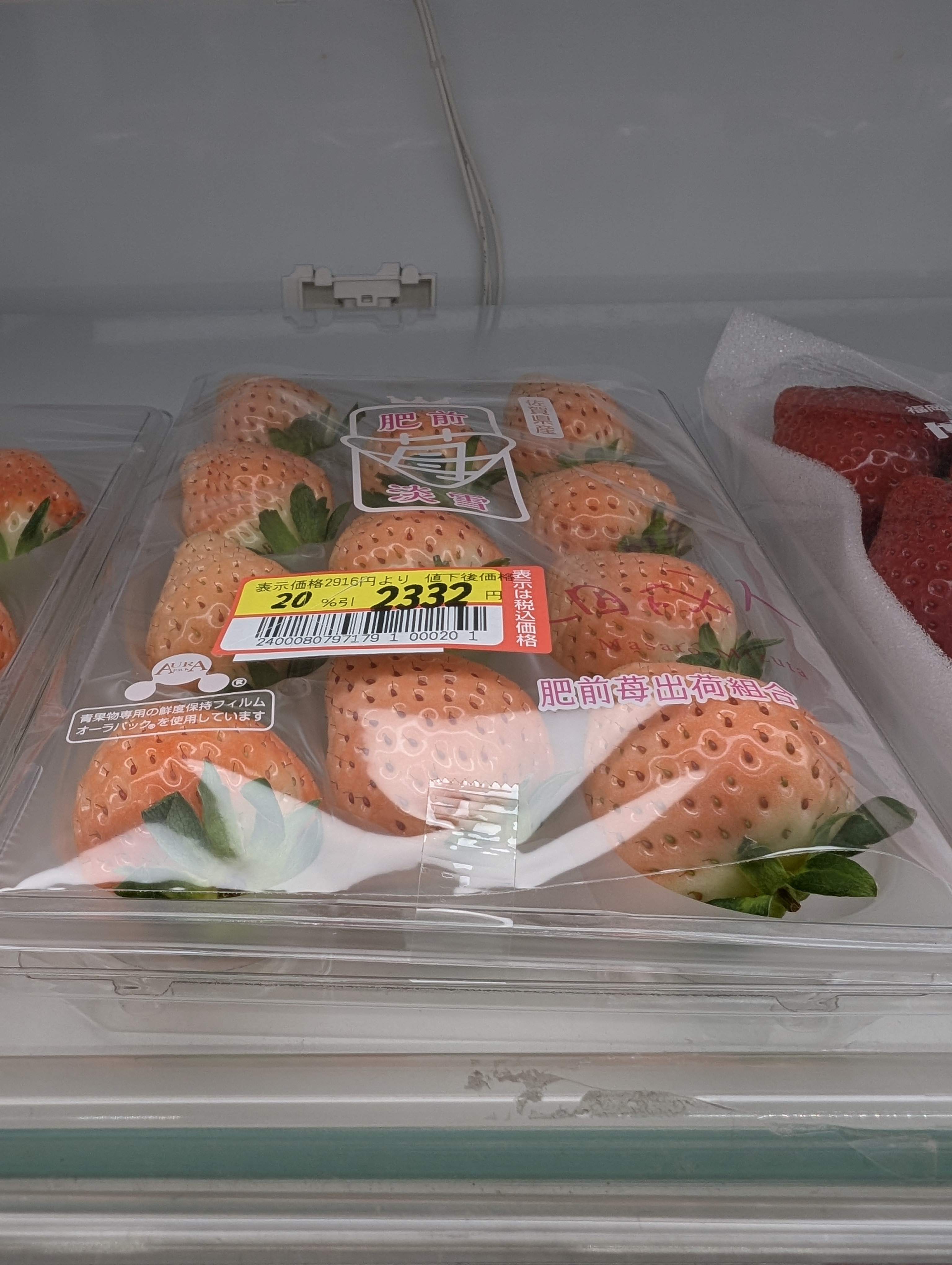Photo taken yesterday (2025-02-08) at a supermarket in Kyoto, Japan.
Alt text: A picture of the eggs section in a Japanese supermarket. There’s a 10-pack of eggs going for 215 Japanese Yen, which is about 1.42 US dollars.
I forgot that the us is one of the few countries that washes the eggs and as a result they have to be refridgerated, its weirs for me to just see them out on the floor at room temperature
I was convinced Japan also washed their eggs. I’m confused.
Also I’m curious about why Americans are really squeamish about people eating any egg products that haven’t been fully sterilized by cooking, while others generally aren’t scared of it, even if they’re in a country that washes eggs just like the US.
In the US, people don’t even taste their cake batter to check the amount of sugar before cooking it; in Canada, a summer isn’t whole until you’ve made strawberry mousse (ingredients: strawberries, egg whites, sugar; eaten raw). Perplexing. Is it riskier in the US, or is the risk equally low everywhere but Americans are really paranoid?
It’s just two different strategies for avoiding salmonella. The US method has worked very well for a very long time. So much so that other countries did adopt it, at least for a time, but it requires an infrastructure that can keep the eggs refrigerated through from processing to consumer, which isn’t trivial.
When they wash the eggs they strip off the protective barrier that keeps pathogens out. Thats why they need to refrigerate them. If your hens are living and laying in fetid squalor then this must be done.
The protective barrier is true, but you’re either making assumptions about the rest or you’ve been misinformed. There really aren’t major issues in any of the developed countries today, but the washing and refrigeration is still the safest with the longest shelf life. It isn’t the condition the chickens are kept in - there are countries where it’s much, much worse than in the US - it’s just that chickens very easily carry salmonella.
Many years ago, more countries washed, but there were some escapes, especially one from Australia with the eggs exported to the UK, and it got a bad name, so some countries dropped it, but the US figured out how to make it work consistently. Most countries require chickens to be vaccinated, but the US hasn’t needed to because of the washing and refrigeration.
Lots of good info online. Here’s a USDA article on it, and here’s a higher level NPR piece.
As a Canadian I’ve never had mousse. Only raw egg consumed is in raw cookie dough and that is a calculated risk.
It’s not the eggs that you should worry about, salmonella is largely controlled by the egg processing company. The wheat used to make flour can be contaminated by rat feces, which is then ground into the batch.
If you want to eliminate the risk, and still eat the raw cookie dough, you can brown flour in the oven before making the cookie dough. It won’t work well if you try to bake it, but if you want to use raw cookie dough (like, in a batch of ice cream) but don’t want to contract e.Coli then brown flour is the way to go.
I mean, I still taste the raw cookie dough before I bake… but just in case someone needed to know, there’s a safe way to do it.
Eh that’s a lot of effort. I’ll stick to the calculated risk with the once a decade or so I’m around cookie dough
You’re missing something!
Japan also washes them. Just not all.
The USDA’s website says that eggs are “washed and refrigerated in Canada, Japan, and Scandinavia”, but that’s a lie regarding Scandinavia in any case (I’m an egg enthusiast btw)… so I wouldn’t be surprised they’re lying about Japan as well.
Btw I took a look at your comment and if it helps, washed eggs are good basically forever too. I never throw them away. I’ve eaten eggs that had been expired for 6 months, and while they were a little dried up (kinda dense; the white had shrunk), they were otherwise totally fine.
You know how they say you know there’s a methane or propane leak because of the smell of rotten eggs… I’ve never smelled rotten eggs. Only propane. Eggs refuse to rot.
That probably wouldn’t pass the float test though, right? I wouldn’t risk it after that long, but I’m glad you didn’t get sick.
Probably not. They contained a lot of air at that point. But yeah … If it doesn’t look, taste or smell rotten, I’m usually not worried by food.
But then again, I’m vegetarian, so I avoid most non-obvious risks by that alone.
Americans are really, REALLY paranoid
About all the wrong things
My eggs better not be dirty! My eggs are too expensive! I need to buy GUNS! …He may be a felon but at least he’s not a brown woman.
No - the US and Europe developed two different methods for handling salmonella.
Starting in the 1970s, the US chose to wash the eggs. The upside is that it eliminates virtually all risk. The downside is that it requires refrigeration throughout the entire supply line, but since they are refrigerated, US eggs last a lot longer; unrefrigerated eggs last about three weeks while refrigerated eggs last about 50 days.
Large portions of Europe didn’t have the infrastructure to support this so the regulators instead chose to vaccinate the chickens. The upside is that no extra steps are required and no extra equipment like refrigerated trucks. The downside is that they don’t last as long.
Both methods work about equally well and are both considered acceptable.
https://tellus.ars.usda.gov/stories/articles/how-we-store-our-eggs-and-why
deleted by creator
US here, I grew up in a township, part rural part suburban, on a farm and this was not a concern for most people out there but all my friends and their families from the suburban side were squeamish. I think it comes down to repeated misinformation reinforcing a fear.
It’s not misinformation. You shouldn’t really eat raw eggs from a commercial setting in the US. Tge chickens are kept in depolarble conditions that encourage disease and bactetia. Eggs from a small farm may as well be from a whole different world.
What I’m trying to say is that I think those people I grew up with maybe had a misconception that the risk was much higher than it actually was. We maybe should normalize pet chickens for small properties. Daily fresh eggs are so good and chickens are adorably goofy animals.
IDK where in the US you are but I don’t know anyone who is squeamish about raw egg.
You are actually significantly more likely to get cross contamination from an unwashed shell than from a properly stored washed egg.
I’m not American, but in a lot of American cooking videos I watch, the host will go like “NEVER eat raw egg” or “I’m tasting a small amount here but it’s a calculated risk I’m taking and you may not want to”.
Why would you wash them?
They often end up with bits of stuff stuck to them while they’re wet, like feathers, bedding, etc. Poop isn’t uncommon either. The same people who won’t buy salmon unless it has that freshly dyed pink color, and won’t buy potatoes if they aren’t universally convex, balk at the bits that remind them they come from a real place and aren’t just summoned into existence for their sake. Washing the eggs takes off the bits but also the ‘bloom’ which is the natural barrier to bacteria and the like. Hence, refrigeration.
Because the conditions that the chickens are raised in promote growth of salmonella to such a degree that they need to chlorinate the outside and scrub & wash away the cuticle. The production model for chickens is so harsh that they can’t keep themselves clean or care for themselves. And the chemical companies profit off the model so there is no incentive to make chickens happier or healthier.
Because it came out of a chicken’s but. Don’t you wash your turds before you eat them? Jk, there’s no good reason to do so.
This is one of those neat factoids that isn’t entirely true.
Japan does wash and refrigerate its eggs, just not all eggs and brands and groceries (it’s not a law).
Refrigerated and unrefrigerated eggs side-by-side

Refrigerated eggs

Most of the low salmonella incident rate comes from a higher inspection rate of egg producers and, here’s the fun one, a higher rate of raw egg ingestion, leading to faster report and response times for when there is contamination.
It blew my mind visiting Europe and finding eggs in a supermarket that weren’t in the fridge
came here to ask about this

damn look at this nice floor texture
Oh my gosh- you could eat off those!
Let’s see Paul Allen’s floor.
My God, is this… eggshell?
Much of Japan is very very clean in general. People take a lot of pride in that!
The Japanese sporting fans leave the stadium cleaner than before the match started. Cleanliness in Japan is taken to new level and the rest of the 1st World could learn from the Rising Sun.
The us has killed more than 15 million chickens just the last few weeks. Sometimes with foam. If other countries have to do that their prices will rise too. NHK had a great documentary recently about an egg family that was doing pasture raised eggs at $1 each.
Guess they shouldn’t have kept the chickens in such horrifying conditions.
It’s actually kind of funny, at Aldi the price of regular eggs doubled to like $4.50, but the price of the free range eggs went up like $0.50 to $5.75. It dawned on me that the reason my egg costs have not varied that much is because I was always buying the better eggs the whole time.
Free range means they put 100k of them in a giant warehouse vs. penning them.
The eggs I’m thinking of are specifically “pasture raised” (the blue box). But you are thinking of “cage free.” In the US “free range” requires access to some amount outdoor space per hen.
I haven always been buying “good eggs” but pasture raised are actually cheaper than battery at my local grocery the last few times I’ve gone. Kinda crazy.
Foam? I thought that was the most unethical method of killing them. Should be banned.
Do not be fooled! These are WOKE DEI eggs from the Deep State. They have pronouns and are full of chemtrails and vaccines.
Man this is like 𝘢𝘭𝘭 food in Japan too. The food is dirt cheap and so much better quality
Yeah but their eggs don’t have salmonella and bird flu.
If you want that in there you gotta pay extra
What’s the average wage in $ in Japan compared to the states?
¥340,000 per month which is around $2,260
What’s cost of living like?
Really depends on the location, just as anywhere can vary in your home country/state/providence… But check this out https://www.expatistan.com/cost-of-living/country/japan?currency=USD
This looks like Tokyo. Can’t imagine spending 370k a month in Osaka or anywhere around.
The website indeed seems to put the prices unfavorably high. Checked for Germany, the “normal area” talks about apartment prices as high as those in cities like Hamburg (which is expensive). They may expect expats to attempt living in those areas more often.
You really shouldn’t use sites like this for comparison as they’re not really adjusted for average expected living in any certain country.
They’re for if you took your lifestyle from country A and tried to transplant it in country B.
A good example is price per square foot for apartments etc. in Japan doesn’t really say anything about how the average living space is also much lower so you shouldn’t try and buy an American suburban house in Japan anyway.
Wait till you see our healthcare prices.
 Orthoepoedist visit and back medicine for two months.
Orthoepoedist visit and back medicine for two months.The crazy thing I used to pay about this amount ~200 yen 11 years ago. I lived in Japan from 2010 - 2014.
Japan was largely allergic to price increases, especially as wages remained largely stagnant. Corona began to see some things slide and Russia also had an impact that, coupled with a yen weakening compared to the dollar, basically opened the floodgates on price increases. It’s in the news basically every week now. Rice is double what it was a few years ago.
I remember that one company apologizing for a ten yen price increase on ice cream.
Japan was largely allergic to price increases
That’s one way to put it. This is another https://www.nomuraconnects.com/focused-thinking-posts/japans-three-lost-decades-escaping-deflation/
The US consumers are getting shafted.
deleted by creator
We deserve it
I get local (I think free-range, but don’t recall) for 400 yen/10. I think “regular” eggs are about the same (edit: same price as in your pic) up here in tohoku
You guys are all lucky I’m not in America anymore or I would delete all of these cheap egg photos for being COMMIE TRASH.
But now I’m in the UK and eggs are a reasonable price. Not that cheap, but reasonable.

Carry on.
Don’t worry. All the savings on eggs are destroyed by 2000 yen strawberries. And rice is incredibly high right now, up about double in the last year.

This is what the ¥862 strawberries look like.


Just got these from the grocery store and they’re like the size of an apple.
They look great! Now I want even more strawberries…
2000 yen for strawberries? How much strawberry is that? I got a handful of strawberries for ¥862 today.
Yes, the rice is expensive.
I was being slightly hypobolic. Because yes there are strawberries under 2000 as well. Even 800 yen is high compared to the states.
To be fair though, February 10 is not exactly strawberry season. So that blame in part goes to this annoying “nature” dude, who came up with “seasons” and shit just to raise prices.
The general point is true, though. Same with apples right now… you look away one second, they jump from 200 to 400円 each 😐
At least (well, debatable) the fruit don’t shrink away at the same time like all the other goods.
A ton are actually grown in hot-houses in northern Japan as well to support the off-season time.













